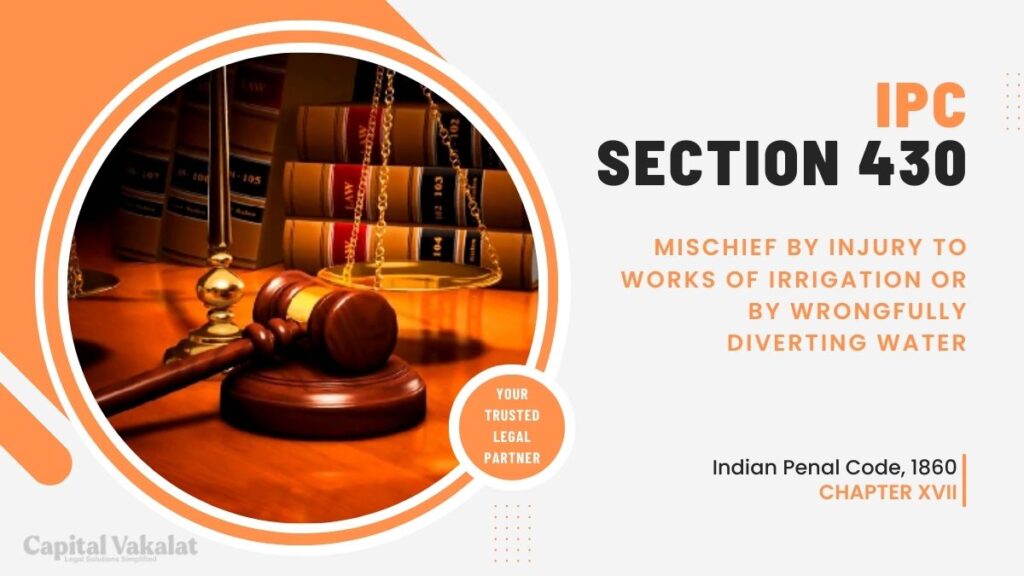Section 430 of the Indian Penal Code (IPC) addresses the serious offense of mischief by injury to works of irrigation or by wrongfully diverting water. This legal provision plays a crucial role in safeguarding the essential infrastructure that supports agriculture, a backbone of many economies.

In this article, we delve into the intricacies of Section 430 IPC, exploring its implications, the importance of works of irrigation, and the impact on farmers and the environment.
Understanding Section 430 IPC
Section 430 IPC specifically deals with the act of causing mischief by injuring or impairing works of irrigation or wrongfully diverting water. This offense is taken seriously under the law, with legal consequences and penalties prescribed for those found guilty. The section serves as a deterrent, aiming to protect vital resources that contribute to the nation’s food security.
Works of Irrigation: Lifeline for Agriculture
Works of irrigation, including canals, dams, and reservoirs, form the lifeline of agriculture. These structures ensure a steady supply of water for crops, playing a pivotal role in the success of farming activities. Damage to these structures can have severe repercussions, affecting the livelihoods of countless farmers and disrupting the agricultural supply chain. The economic impact of such damage extends beyond immediate losses, creating a ripple effect throughout the economy.
Types of Mischief under Section 430 IPC
Section 430 IPC encompasses various forms of mischief, including the intentional injury to irrigation works and the wrongful diversion of water. Examples of mischief under this section may include tampering with canal gates, damaging reservoir walls, or redirecting water for personal gain. Understanding the different ways mischief can be committed is essential in both legal interpretation and enforcement.
Impact on Farmers and Agricultural Communities
Real-life scenarios highlight the direct impact of mischief under Section 430 IPC on farmers and agricultural communities. Instances of damaged irrigation structures lead to reduced yields, financial losses, and increased hardships for those dependent on agriculture. The disruption caused by such offenses goes beyond individual farmers, affecting entire communities that rely on agriculture for sustenance and income.
Environmental Consequences
Beyond the immediate economic impact, there are significant environmental consequences associated with mischief under Section 430 IPC. Wrongfully diverting water can disrupt local ecosystems, affecting flora and fauna dependent on a consistent water supply. The long-term damage to the environment raises concerns about sustainability and the delicate balance of natural resources.
Historical Cases and Precedents
Examining historical cases and legal precedents provides insight into the interpretation and application of Section 430 IPC. Notable cases have shaped the understanding of this legal provision, establishing important principles for addressing offenses related to mischief against works of irrigation. Legal interpretations and judgments play a crucial role in ensuring justice and fair enforcement of the law.
Challenges in Enforcement
Enforcing Section 430 IPC comes with its own set of challenges. Proving offenses under this section requires careful investigation and collection of evidence. Loopholes in the legal framework and difficulties in establishing intent can pose challenges in holding perpetrators accountable. Identifying and addressing these challenges is essential for effective enforcement of the law.
Preventive Measures and Safeguards
To mitigate the risks associated with mischief under Section 430 IPC, preventive measures and safeguards are crucial. Community involvement and awareness campaigns can play a significant role in protecting irrigation works. Embracing technology, such as surveillance systems and remote monitoring, can enhance the security of these vital structures. A holistic approach that combines legal measures with community engagement is essential for preventing offenses and preserving water resources.
Conclusion
In conclusion, Section 430 IPC stands as a guardian of works of irrigation, protecting the lifeline of agriculture from mischief and wrongful diversion of water. The economic, environmental, and social implications of offenses under this section emphasize the need for robust enforcement and preventive measures. As custodians of our natural resources, it is our collective responsibility to uphold the principles of Section 430 IPC and ensure the sustainable use of water for the benefit of present and future generations.
Frequently Asked Questions
How can communities actively contribute to the protection of works of irrigation?
Communities can actively contribute by participating in awareness campaigns, reporting suspicious activities, and collaborating with authorities to ensure the security of irrigation structures.
Are there any recent legal developments related to Section 430 IPC?
Stay updated on legal developments through official sources, as amendments and judgments may impact the interpretation and application of Section 430 IPC.
What role does technology play in preventing offenses under Section 430 IPC?
Technology, such as surveillance systems and remote monitoring, can enhance the security of irrigation structures, acting as a proactive measure against potential offenses.
How can farmers seek legal recourse if they are victims of mischief under Section 430 IPC?
Farmers affected by mischief under Section 430 IPC should promptly report incidents to law enforcement agencies and seek legal advice to pursue appropriate legal recourse.